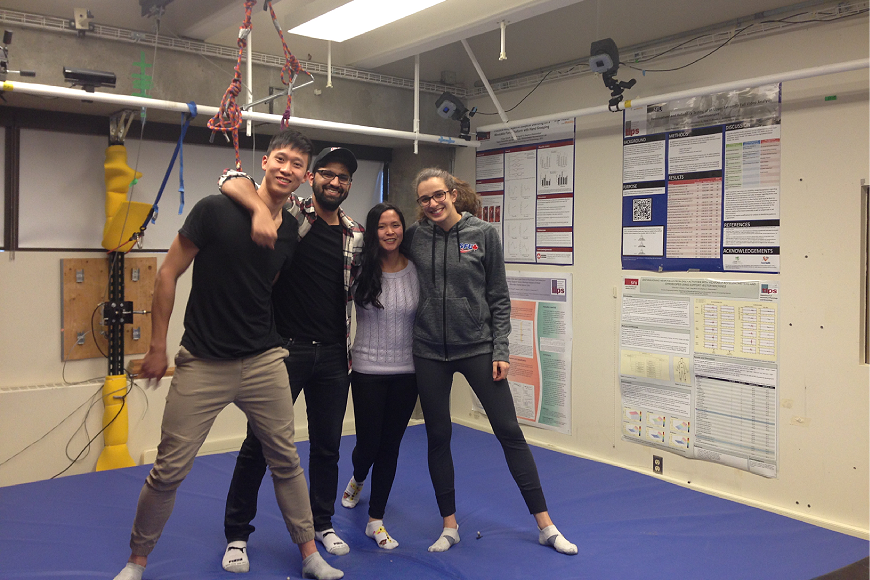
I never saw myself being involved in research. It’s not because I had anything against research, I just never pictured myself working out of a lab. Fast-forward two co-op terms later and I find myself wondering what I was ever thinking! My experiences as a Research Assistant for the Healthy Aging Study (BC Cancer Agency’s Genome Sciences Centre) and the Technology for Injury Prevention in Seniors (TIPS) project (Injury Prevention and Mobility Lab at SFU) have been two of the most enriching and inspiring experiences of my life. Thus, with the Biomedical Physiology and Kinesiology (BPK) Research Day fast approaching, I felt obligated to write about just how amazing research can be, for any undergraduate student that is skeptical of research like I once was. Using social media, I asked 12 undergraduate students in the BPK department a simple question: What do you like about research? I’ve put together all of our responses to give you the six things us undergraduates like about research. Enjoy!
The Process
Science is constantly evolving and morphing, making research challenging, tedious and oftentimes frustrating. Between the hours of data entry, unexpected results and unforeseen errors, sometimes it feels like nothing will go according to plan. However, it is these hardships that make you appreciate how much work goes on behind the scenes, in order to conduct research, and how difficult it is to make discoveries. The hours of literature reviews can lead to gaps that your research could fill. The time spent designing your study can distinguish your study from not just being good, but great. As much as you may despise the research process and all the grey hair it may have caused you, the hard work invested into it makes you feel proud to be involved with your project and excited to see it come to life.
Beyond the Classroom
Research goes beyond the stagnant learning in lecture halls. Rather than simply sitting in class and inactively absorbing information, you are challenged to apply all of the things you’ve learned in the classroom and build on previous knowledge. As a fellow BPK student said, “In research, we are focused to think of ourselves, more critically, more independently, more creatively and less robotically”. Unlike the classroom, research has an innate autonomy that allows one to take on a project they are passionate about and see it grow. Furthermore, you are continually challenged to trouble-shoot, analyze and think more deeply, helping you grow as an individual. You don’t get those kinds of experiences in a classroom setting.
Collaborative Problem Solving
A common misconception is that research is lonely and desolate; when in reality, it is the exact opposite. One of the BPK students shared that, “Research brings together a group of like-minded individuals who are as invested as you to find the answers to various clinically relevant questions”. There is no road map—projects are built by sharing knowledge at lab meetings, conferences, through presentations or simply over coffee. Whether you’re an undergraduate, PhD fellow or principal investigator, each member of the team brings something different to the table, providing depth to one’s project. The integration of ideas and multi-disciplinary nature of research is not only required in order to resolve various scientific questions, but can also be one of the most appealing aspects of the field.
The People
When working for a lab, you come into contact with various individuals from all over the world, with all sorts of academic backgrounds. From volunteers to participants to staff, research provides a platform to make meaningful connections and build a network for the future. When the people participating in the project are as excited and invested as the people conducting the project, that’s when you know something special is happening. Furthermore, as one BPK student said, “It’s inspiring to be around these amazing individuals who have accomplished so much in such a short period of time”. If you were to Google the people involved with any of the labs at SFU, you will be both amazed and highly intimidated by how much they have accomplished. It is truly a privilege to be working with some of the brightest and boldest in science.
Being Comfortable with the Uncomfortable
With the endless moving parts to a project, there is truly never a dull moment in research. The fast-paced lab environment is at times overwhelming, with your brain being constantly overfilled with information. Moreover, you can never quite know enough or anything for certain, leaving you feeling stuck in an uneasy state. With that being said, a BPK student shared that the main thing they’ve enjoyed most about research is, “Being pushed outside of my comfort zone.” It is these aspects of research that make it thrilling. You are challenged to think outside of the box. The more you begin to find out, the more you begin to venture into unknown territory. The most satisfying part is when you reach the point where you realize, regardless of the outcome, that all of the options in front of you lead to learning.
Making a Difference
Last but not least is the impact research has on the scientific community and the world. Both expected and unexpected results have the power to directly influence people’s lives. For example, over 30% of older adults (over age 65) living in the community, and 60% of older adults in long-term care (LTC) fall at least once every year, leading to severe injuries and sometimes even death. With this information, the TIPS lab at SFU set out to obtain a better understanding of how and why older adults fall, using video capture and analysis of real-life falls in older adults. Consequently, Robinovitch et al. (2013) were able to identify the most common causes of falls and activities that lead to falls. The insight provided from this study has been able to assist long-term care facilities and the community in developing better technologies and fall prevention strategies to not only mitigate fall frequency but also decrease the severity of fall injuries. This is just one of many examples of impactful research being conducted at SFU. Therefore, research provides us with new and comprehensive knowledge that will impact health care systems, policies, and the quality of life for current and future generations.
Thank you to all of the BPK undergraduate students who shared their thoughts and opinions about research. I hope I have provided more insight and refreshed your current perception of research. Although I have mentioned six reasons, I look forward to seeing this list grow over time as I hear more from others about their experiences in the field of research.
Also, be sure to attend BPK Research Day 2017 at SFU Burnaby on Friday, March 31, 2017 in the SFU Theatre (Leslie & Gordon Diamond Family Auditorium). For more information, visit the website. Hope to see you there!
Reference
Robinovitch, S. N., Feldman, F., Yang, Y., Schonnop, R., Leung, P. M., Sarraf, T., Sims-Gould, J., & Loughin, M. (2013). Video capture of the circumstances of falls in elderly people residing in long-term care: an observational study. The Lancet, 381(9860), 47-54. doi:10.1016/s0140-6736(12)61263-x














